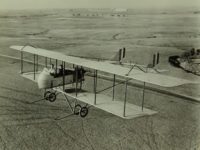The Farman M.F.11 was an early French reconnaissance aircraft and light bomber that flew the first bombing raid in World War I.
Development and construction:
The Farman M.F.11 was a further development of the commercially very successful Farman M.F.7 which had already been developed and built a few months beforehand.
In contrast to the M.F.7, however, the length of the nacelle was shortened in the M.F.11 and it is no longer placed on the lower wing. In this model, the gondola hung centrally between the two wings and was also designed for 2 people. At the end of the nacelle, the pusher propeller was mounted again, which provided 70 HP for a speed of around 100 kilometers per hour.
This time the horizontal stabilizer was relocated to the stern, and only short runners were mounted on the landing gear to prevent overturning. This made for the nickname "Shorthorn".
At the end of 1913, the first test flights with the prototypes and the presentation of the aircraft began. In addition to being produced in France, the Farman M.F.11 aircraft were also built under license in the UK.
Use in the First World War:
With the outbreak of World War I and the rapid establishment of an air force, the Farman M.F.11 aircraft were among the first aircraft to be used by both France and Great Britain in the war.
The tasks mainly included reconnaissance flights, but after a short time there were attempts to use the aircraft as bombers. Farman M.F.11 aircraft achieved the first success with this new tactic on December 21, 1914, when they bombed German artillery positions in Ostend, Belgium. These attacks were considered the first bombing raids in World War I.
After Italy entered the war, the Fiat company also built Farman M.F.11 aircraft there under license and used them in the Italian theaters of war.
When the first German monoplane fighter planes appeared on the western front in mid-1915, the Farman M.F.11 began to be withdrawn from the front and used in France for training new pilots. On other fronts, such as the Italian one or the one in the Middle East, the aircraft remained in use for much longer.
Technical specifications:
| Description: | Farman M.F.11 |
| Country: | France |
| Type: | Reconnaissance plane Bomber Training aircraft |
| Length: | 9,50 meters |
| Span: | 16,15 meters |
| Height: | 3,90 meters |
| Weight: | 550 kilograms empty |
| Crew: | Max. 2 |
| Engine: | an eight-cylinder in-line Renault engine with 70 HP (51 kW) |
| Maximum speed: | 100 kilometers per hour |
| Range: | Max. 3 hours and 45 minutes |
| Armament: | 1 machine gun 7,7 mm 131,4 kilograms bomb load (18 × 7,3 kilograms) |
This post is also available in:
 Deutsch (German)
Deutsch (German)  Français (French)
Français (French)  Italiano (Italian)
Italiano (Italian)  简体中文 (Chinese (Simplified))
简体中文 (Chinese (Simplified))  Русский (Russian)
Русский (Russian)  Español (Spanish)
Español (Spanish)  العربية (Arabic)
العربية (Arabic)

















